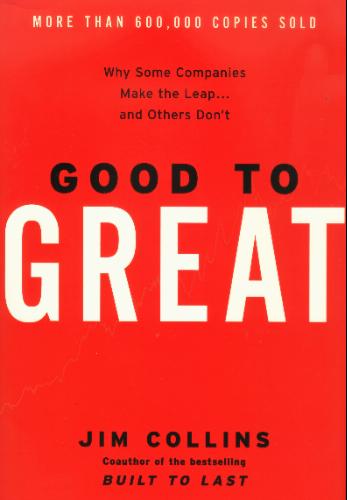 Just got done reading my 4th book of the year. In my last book review post I said it was my 5th book of the year, which was a lie, it was my fourth, so ... I am just going to call this one my 4th! But who's counting? (well, I guess I sorta am since I made it one my goals this year to read X amount books)
Just got done reading my 4th book of the year. In my last book review post I said it was my 5th book of the year, which was a lie, it was my fourth, so ... I am just going to call this one my 4th! But who's counting? (well, I guess I sorta am since I made it one my goals this year to read X amount books)Good to Great by Jim Collins
Overall, great book, had some great takeaways. This is a book that has been around awhile, and without looking at any specific data at all, I would say has been one of the top 10 business books to read in the last 10 years? One of the best takeaways from the book for me was when Jim talks about a stable of horses, referring to every worker in the work place. You have a show horse and you have a plow horse. What kind of horses do you want working for you and what kind of horse do you want to be? Which in the end he gets to the point that it is best to be/have a plow horse that eventually wins best in show.
I feel like at the position I am in right now in life and work, this book may not have been suited for me. But it is a book that I will take away some "leader" insights to hopefully use in the future if that type of position arises.
Tidbit Takeaways:
- To be a level 5 leader you must have Humility and Will, never letting your ego get in the way of your ambition. He states that the biggest obstacle that we have is balancing humility and ambition - "putting aside egotistical needs for the betterment of building something greater than oneself."
- Level 5 Leaders (being the best) always give credit to someone else, or credit luck but never credit themselves. As Jim states it, the Window and Mirror metaphor - a level 5 leader always looks out the window to give someone else praise and in a mirror when something goes bad = looking at themselves. Compared to other leaders who do the opposite. Window for the bad and mirror for the good happenings.
- Great concepts on building Discipline - build a culture around freedom and responsibility within a framework, fill that culture with self disciplined people, don't confuse the culture by being a "tyrannical disciplinarian"
- "The real question is not, "Why Greatness?" but "What work makes you feel compelled to try to create greatness?" If you have to ask the question, "Why should we try to make it great? Isn’t success enough?" then you’re probably engaged in the wrong line of work."